某公司商务英语口语培训教材(一)汇总
国际商务英语口语实训ppt课件
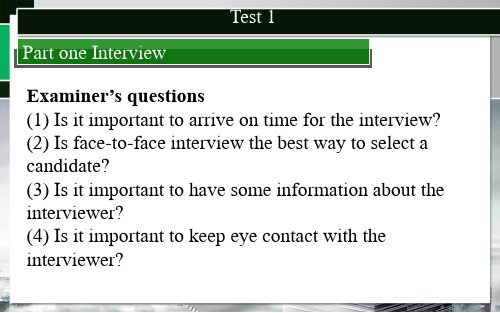
Test 1
Part Two Mini-presentation
Direction: In this part of the test, you are asked to make a short presentation on the topic for about a minute. You will have a minute to prepare this. Topic: What is important when preparing for an interview? ● Studying the job advertisement ● Finding out about the company ● Preparing yourself psychologically
(2) I suppose so. To see the candidate in person will to some extent help the interviewer to know the candidate's personality.
(3) Yes, indeed. If you learn the name and title of the person you'll be meeting with, you can be sure about the waest 1
Part Three: Collaborative task and discussion
Follow-up questions (1) Yes. Don't be afraid to disagree with your interviewer in an agreeable way. If you don't disagree at times, you become, in effect, a "yes" man or woman. (2) No. The interviewer might infer that you are only interested in your own needs and not those of their company. Wait until the interviewer raises the subject.
《商务英语口语(基础篇)》课件 商务英语口语 第一章

Focus
Evaluation Culture
14
Project One Career
Part Ⅲ Language Expanding
(1)Can you tell me what your full name is, please?
能把你的全名告诉我吗?
(2)How do you spell your full name?
你个性上最大的特点是什么?
15
Project One Career
Part Ⅲ Language Expanding
(7)Helpfulness and caring.
乐于助人和关心他人。
(8)Adaptability and sense of humor.
适应能力和幽默感。
(9)What personality traits do you admire?
你的全名怎么拼写?
(3)I was born on June 22, 1980.
我生于1980年6月22日。
(4)You look very young. How old are you?
你看上去很年轻,你多大了?
(5)I am just over twenty-two.
我刚过22岁。
(6)What is your strongest trait(s)?
1 English into Chinese
Practice 1 Interpretation
(1)Are you willing to work for extra hours? 你愿意加班吗?
(2)I think I’m qualified for the job if I can be given the chance. 如果能给我这个机会,我相信我能胜任这份工作。
商务英语教程第一课基础工作词汇Business English Course 01
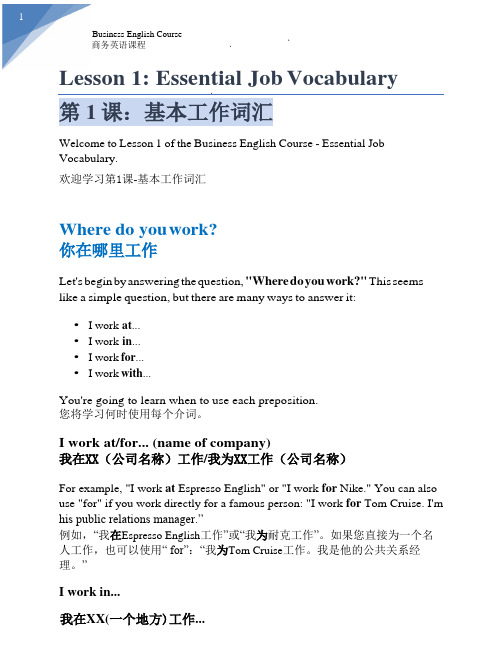
Lesson 1: Essential Job Vocabulary第1课:基本工作词汇Welcome to Lesson 1 of the Business English Course - Essential Job Vocabulary.欢迎学习第1课-基本工作词汇Where do you w ork?你在哪里工作Let's begin by answering the question, "Where do you work?" This seems like a simple question, but there are many ways to answer it:•I work at...•I work in...•I work for...•I work with...You're going to learn when to use each preposition.您将学习何时使用每个介词。
I work at/for... (name of company)我在XX(公司名称)工作/我为XX工作(公司名称)For example, "I work at Espresso English" or "I work for Nike." You can also use "for" if you work directly for a famous person: "I work for Tom Cruise. I'm his public relations manager.”例如,“我在Espresso English工作”或“我为耐克工作”。
如果您直接为一个名人工作,也可以使用“ for”:“我为Tom Cruise工作。
我是他的公共关系经理。
”I work in...我在XX(一个地方)工作...a place:一个地方:•I work in an o ffice. 我在办公室工作。
商务英语口语教程
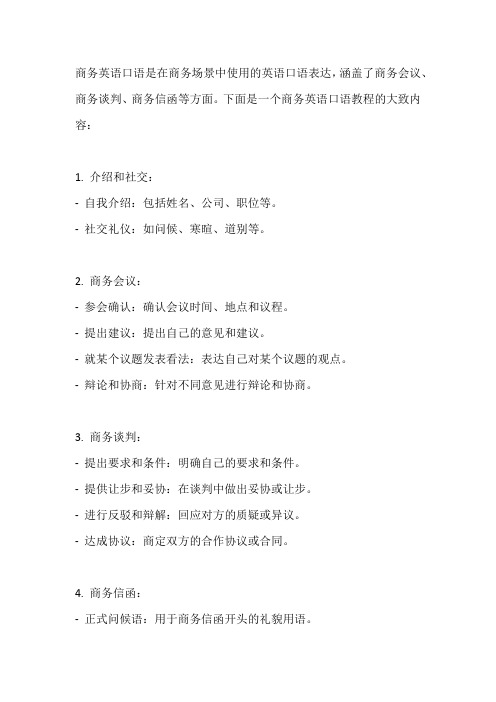
商务英语口语是在商务场景中使用的英语口语表达,涵盖了商务会议、商务谈判、商务信函等方面。
下面是一个商务英语口语教程的大致内容:
1. 介绍和社交:
-自我介绍:包括姓名、公司、职位等。
-社交礼仪:如问候、寒暄、道别等。
2. 商务会议:
-参会确认:确认会议时间、地点和议程。
-提出建议:提出自己的意见和建议。
-就某个议题发表看法:表达自己对某个议题的观点。
-辩论和协商:针对不同意见进行辩论和协商。
3. 商务谈判:
-提出要求和条件:明确自己的要求和条件。
-提供让步和妥协:在谈判中做出妥协或让步。
-进行反驳和辩解:回应对方的质疑或异议。
-达成协议:商定双方的合作协议或合同。
4. 商务信函:
-正式问候语:用于商务信函开头的礼貌用语。
-表达感谢和赞赏:感谢对方的合作或支持。
-提出请求或建议:向对方提出请求、建议或询问。
-结尾和致意:合适的结束语句和祝福。
5. 商务电话:
-接听电话:用适当的问候语接听电话。
-提供信息和解答问题:回答对方的问题或提供所需的信息。
-安排会议或电话会议:商讨日程安排并确定会议方式。
6. 商务演讲:
-开场白:吸引听众注意力并介绍演讲主题。
-主要内容:清晰地陈述主要观点和论据。
-结尾总结:对演讲内容进行总结,并提出行动建议。
以上是一个简单的商务英语口语教程的概览,实际教程可能根据不同的课程设置和学习需求有所调整。
在学习口语时,通过模拟真实情境、角色扮演和大量练习,可以提高商务英语口语表达能力。
高级商务英语口语教材Word版
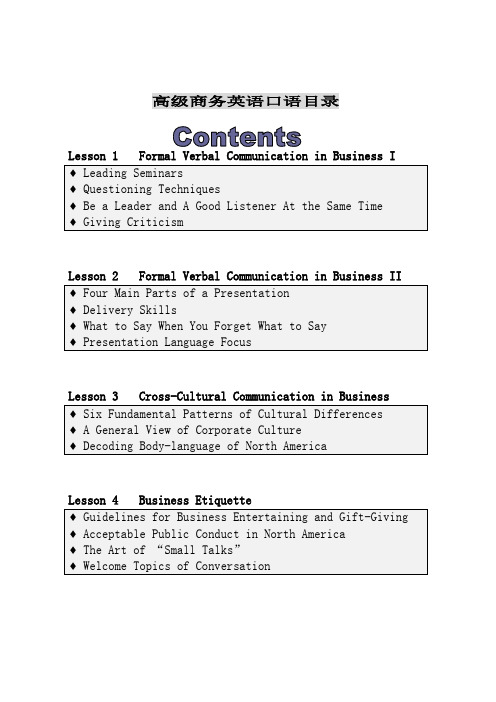
高级商务英语口语目录Lesson 1 Formal Verbal Communication in Business ILesson 2 Formal Verbal Communication in Business IILesson 3 Cross-Cultural Communication in BusinessLesson 4 Business EtiquetteLesson 5 Contract EnglishLesson 6 Negotiation EnglishLesson 7 Business ReportingLesson8 Business News ReadingLesson9 Interview EnglishLesson OneFormal Verbal Communication in Business I正式商业交流(1)–研讨会Part I ObjectivesPart II The How-TosLeading Seminars/ Questioning Techniques✧General procedures of a seminar/lecture1) Self-introduction2) Introduction of Topic3) Describing sequences and timing4) Highlighting information5) Involving the audience6) Giving instructions7) Checking understanding8) Asking questions9) Clarifying questions10) Evading questions11) Inviting comments12) Interrupting13) Transitions14) Reformulations15) ClosingLanguage ReferenceSelf-introduction 自我介绍Good morning, I'm ---- and I've been invited to give this talk/ presentation / lecture because---I have done research in / I have a special interest in / my experience is inIntroduction of Topic 话题介绍In my presentation/talk/lecture today I shall be dealing with---The subject of my ---- today is ----What I'd like to do today is introduce/suggest/ analyse/ describe / explainMy topic/subject today is ---I shall be dealing with 2/3/4…. main areas/topics/subjects todayDescribing Sequences and Timing 程序介绍与时间安排First I want to /spend a few minutes outlining ---/remind you of the background to/summarise the ----/explain---/ present---Next I shall---/after that I will take the opportunity of describing---/Then we'll look at---Finally I want to---Highlighting Information 重点介绍(Rhetorical questions)So, what does that mean?/How can we interpret this?/What's the explanation for this?/What are the implications of these findings?(Change of focus)What that tells us is/What I'm suggesting is/What is clear is that(Introducing auxiliary verb)So clearly we do need to--/Obviously they did understand that---/ Of course you do wan to know why---Involving the Audience 听者的参与Let's have a show of hands, how many of you agree with ----I'm sure we all know what it's like to---Let me ask you spend a couple of seconds thinking about---Well, what would you do, I wonder---Just look around the room and take a note of /how many men are wearing a tie---/how many people are wearingjeans---/the average age of the participantsGiving Instructions 给予指示For this exercise, we are going to work in pairs: groups of 3/4/5Make a note of these words/figuresRead the paragraph on page ---Please note that I shall be timing the exercise and you have exactly 7 minutesNow complete the questionnaire and put your name in the top left-hand cornerChecking Understanding 随时观察听者反映Is everyone with me so far?Are there any questions at this stage?Would anyone like me to run through that again?If you have any problems with the detail, don't worry because all the information is in your handoutAsking Questions 询问问题Direct questions/open-ended:What/why/how/where/whenClosed questions :Do you/did youDelicate questions:I was wondering if/ could I ask you/ would you mind telling me/if it's not indiscreet I'd like to know/might I ask/may I askClarifying Questions 澄清问题So you want to know about---/is it the figures that worry you/ when you say---do you mean---/If I've understood the question you want to know about---Evading Questions 回避问题That's not really my field---/ that's a bit outside the scope of today's topic/ I haven't got the precise information with me today/ that's not really for me to say/I'd need notice of that question to answer you in full/this is not really the place to discuss that matter/ perhaps that's a question for another meetingInviting Comments 鼓励并听取意见Has anyone got any questions at this point?Would anyone like to comment on that?Does anyone disagree with my last point?Can anyone confirm my experience?If nobody has any questions then I'll move onInterrupting 中断I'd like to discuss it further, but I think it's time to move onCould I just stop you there---If I might just add----I'm sure we'd all agree, but perhaps we should get back to the main pointTransitions 过渡If we could now turn to---/my next point is---/ what I want to do next is ---/ let's move on to---/that completes my analysis of---/so, now we are going to----Reformulations 总结If I might just go over that again---/so, in summary---/ just to remind you of the key facts/the main points/ the advantages of---/my main arguments were---Closing 结束Thank you for listening to me todayI hope you have found my presentation usefulThank you for your attentionQuestioning Techniques 提问技巧Reasons for asking questions:To obtain informationTo find out the opinions of other peopleTo ask other people to contribute ideasTo find out the reasons behind eventsTo seek confirmationThe status of the questionerThe questioner may have an official need to ask questions - work-role, legal power, etc., or the questioner may have an entirely personal curiosity to satisfy. If the role is official, the questioner needs to choose the questioning style with care in order to produce the required results. Questioning can be quite a threatening activity in some circumstances. For example, if the questioner wants information , then the person who has that information may feel that s/he is being asked to give up something that represents an advantage. If the questioner is merely curious in a social setting , then the important point is the level of delicacy of the question. In most cultures, very personal details such as how much money we earn is too private to form the subject of questions by others.Choices of question styleClosed v. openClosed questions permit only 'yes'/'no' answers. They may therefore be more threatening than open questions because they leave no room for expansion or explanation. The questioner needs to decide if it would be more tactful to ask:Have you finished that report yet?OrHow are you getting on with that report?The first question implies that the report is now due; the second merely asks for a progress statement. The open question allows the respondent to elaborate and does not have overtones of authority.Wh- type questionsQuestions starting with question words: what, when, why, who, how, are open questions but they are also very direct. Too many questions like this have the flavour of an interrogation and may make the person being questioned feel uncomfortable. It may be necessary to preface the questions with phrases that show the questioner is aware of the intrusiveness of the question:May I ask you…Could you tell me…Would you mind te lling me…I wonder if I could ask you….I would be interested in knowing…If it's not indiscreet, may I ask ….I know it's not really my business, but….Facilitative styles of asking questionsIf the intention of the questioner is really to prompt the interlocutor in disclosing information freely, then question techniques may not be appropriate at all. Instead it might be better to echo and to reformulate in order to give the interlocutor the opportunity to expand.Illustrative dialogueA. Well, I live in a flat in a rather poor part of town.B. Poor part of town…?A. Yes, it's quite dirty and the streets are badly lit.That's why I don't like going out alone at night.B. So you're frightened to go out alone?A. Well, yes because we hear of attacks and muggings.That's why I want to leave.In this dialogue, speaker B doesn't try to take the initiative, but merely echoes and reformulates to prompt speaker A to say what worries her.Part III Let’s Talk BusinessLEADING THROUGH CHANGE:Listening as aleaderOften, when we think of communication, wethink of speaking, presenting,writing--delivering a message in some way.But an effective communicator is alsoadept at receiving messages. You won'tbudge people toward a goal if they don'tfeel that they've had input, that they'vebeen heard and understood, and that thevision they're working toward is alsotheir own vision. Listening to your followers is the only way you can make this happen.To be a good leader, HEAR OUT what others have to say:Hold judgment and hold eye focus Listen carefully and with an open mind--if you're defensive you may miss critical information. Don't formulate your answer while a person is still speaking. Watch for subtle body language that may offer extra clues to the speaker's true meaning. Also, hold eye focus. If you don't' look at the person who is speaking to you, you can't establish trust. As a leader, you want followers to trust you and believe in you.End all other tasks.Show respect for people by putting aside your paper, lunch, etc., and don't take phone calls. You'll be better regarded, and you'll save time. By "doing it right the first time," there won't be misunderstandings or any need to repeat information. Be ready to job down notes as the person speaks.Allow the speaker to finish. Don't interrupt. Don't change the subject. Don't finish sentences for the speaker. Remain quiet until you're sure the speaker has completed his or her thoughts.Read between the lines.As you listen to the speaker, listen for what might be left unsaid. It's not always easy for a person to approach someone in a more senior position and tell it like it is. If you want to get an honest opinion of some of your ideas and actions, you'll need to probe. You'll also need to value that feedback and the person who gave it to you. Never shoot the messenger.Outline your understanding. Once the person is finished speaking, reiterate what you believe to be the main ideas, issues, etc. State them simply and, if possible, try to "rank" them from most important to least. At each step, ask the speaker if you've correctly heard the message. Take the time to be certain, or you've both simply wasted time.Underline major points. Once you and the speaker agree on the main ideas that have been uncovered, focus your attention on one or two of the most important: What needs to be done right now to make the speaker--and you--acknowledge that something positive has been accomplished? What else can be done in the future? Set a date to revisit these main ideas and to discuss progress.Test the waters. Take what you've learned and test it with others. What are others feeling and thinking? Is this an isolated issue? Don't take it any less seriously but if it's a "movement" of sorts, you'll need to address it differently. Testing the waters allows you to explore the real needs, fears and hopes of your followers and incorporate them into your shared vision. Remember, if you're trying to move people in a new direction, you must know here they're coming from.People don't always need leaders to agree with them and act on their suggestions. But people always do need to feel their leader cares enough to listen. When people are uncertain what tomorrow may bring, a leader with a reputation as a "goodlistener" may be the most prized employee in any organization. Work hard to make yourself that person.Part IIII Exercises and DiscussionExercise to sensitize your questioning techniques.1 Write on the board a list of 5 or 6 prominent people that everyone knows. Some of these people should be the subject of current controversy.2 Write a question of each type (see reasons for asking questions at the beginning of this unit) and address each of your questions to one of the people you have listed.3 Now grade their questions for levels of delicacy on a scale 1 - 5, with 5 being the most delicate.4 Check their questions for the appropriateness of their style - are they open or closed; direct or indirect? Adjust the phrasing of the questions to suit the level of delicacy.5 Lets discuss the results.✧Give examples of situations where open/closed types ofquestions are generally asked.✧Choose one of the following topics and make it into aseminar. Try to incorporate all the 15 elements mentioned in part II.-How to boil an egg-How to organize a picnic for your company-Key factors consumers should be aware of when purchasing a DVD player✧Rewrite the conversation between John and Mary in Partfive. Discuss on the possible outcomes of theconversation with your partner.Part V Supplementary MaterialsGiving CriticismWhen it's necessary to criticise the work of colleagues it is important to do so in a manner that is supportive and that permits the other person find ways of improving his or her performance. To do this we need to:Concentrate on the error, not on the person•Avoid generalizations•Provide specific examples of the problems that need attention•Make helpful suggestions for improvement•Avoid a one-sided attack•Avoid insinuations and hints•Conduct the criticism in private so as not to humiliate the other personRead the dialogue below and make a note of the ways in which John fails to observe the advice given above in his criticisms of Mary's work:John:Come in and take a seat, Mary. This won't take a minute. Mary: What's this all about, John?John: Well I'm sorry Mary, but I've come to the conclusion that your work's just not up to scratch. I need to see a big improvement if you want to stay here.Mary: I see. I admit I have found these first few weeks a hard, but I need time to settle in and there's a lot to learn. (Knock at the door)John: Come in.Jane:Oh, sorry John, I'll come back later, I didn't realize you were talking.John:That's all right, come in. I was just telling Mary that I don't think she's really up to the job here.Jane:No, I don't want to intrude on a private conversation; I'll come back later.Mary: So what are you saying John, are you firing me? John:No; but I have to say that if this little talk doesn't make you realize where you're going wrong, it may come to that.Poor Mary! John has just attacked the standard of her without giving her any idea of where she is going wrong; on top of that he's repeated the criticism in front of another member of staff.By using some of the suggestions below, see if you can rewrite the dialogue so that John offers Mary constructive and positive criticism that will help her to improve her performance:•Invite Mary to a private interview•Ask if she is ready to discuss the standard of her work •Acknowledge the fact that she is new to the company and that there is a lot to learn•Say that her reports are lacking in detail and accuracy •Ask her if she is aware of that•Say that she is often late in the morning•Ask her if there are personal problems that make it difficult for her to arrive on time•Say that some of the clients she deals with have complained that she misses appointments•Ask her if she can explain why this is•Ask her if there is anything you can do to help her improve in these areas.•Set a date for another talk in a few weeks to review her progress.If John conducts the interview along these lines, Mary will:•Know exactly which aspects of her work are unsatisfactory•Will have the opportunity to explain why she has problems•Will not be publicly humiliated•Will feel that she is getting support in her efforts to improve.Reference✧Brenda Townsend Hall,1998✧Lesson TwoFormal Verbal Communication in Business II正式商业交流–商业演示(2)Part I ObjectivesPart II The How-Tos✧Four parts of a presentationFormal presentations are usually divided into four main parts.●The introduction●The overview●The body●The endingThe introductionAt the very least, the introduction should introduce the subject of your presentation.“Today I’m going to tell you about the recent improvements that have been made to the XL series of engines.”Depending on the situation, it will also do one or more ofthe following:●Give the audience a reason to listen“These improvements give greater fuel efficiency and also lower production costs.”●Provide background information.“As you probably know, our market share has be en falling in recent years.”●Narrow the topic.“In particular, I will show you how these improvements make our engines better than our competitors.”The overviewThe overview provides a preview of your presentation for the audience. It is easily done by explaining the structure of your presentation.“First, I’m going to describe the new features of the engine.”“Second, I’ll show you some performance data of the engine’s fuel efficiency.”“After that, I’ll explain how the new features will allow us to r educe production costs.”“Finally, I’ll show a comparison with our competitors’ models.”The overview is very important. It helps the audience to organize the way they listen. It is similar to the contents page of a book.As long as the presentation is well-organized, the overview is the easiest part of the presentation to prepare.The bodyThis is the main content of the presentation. How it is organized will depend on the type of presentation. It should be organized logically to match the overall purpose of the presentation.The endingThe ending usually does two things.It reviews the information and ideas that were presented in the body of the presentation. This is called the summary.“As you can see, these improvements increase fuel efficien cy and allow us to lower our production costs.”It restates the main purpose of the presentation which was stated in the introduction. This is called the conclusion or concluding statement.“I am sure these improvements will allow us to win back our ma rket share.”Delivery skills1. Look organizedThe audience will have confidence in someone who seems to know what he or she is doing. Arrange your papers on the desk. Check the OHP(over-head projector). Put your bag in a suitable place. Put your notes in a suitable place. Change the seating arrangement if you don’t like it. Check that everyone can see you and your visual aids.2. Use natural gesturesDon’t try to be a great actor. Rely mainly on the content of your presentation, not on acting skills. Use the same gestures you would use if you were explaining the same thing to a colleague in a one-to-one conversation.To ensure that you use gestures naturally, avoid clasping your hands behind your back, clasping them in front of you, or placing them on your hips.If you are holding notes, try to hold them in one hand, leaving your other hand free to make gestures.3. Eye contactLook at individual members of your audience, just as if you were having a conversation with them. Don’t bury your head in your notes. Try not to look at the ceiling when youcan’t remember what to say.4. SignalingIn writing, you use paragraphs to show the parts of your presentation. In presentations, you have to do it in other ways. You can use verbal techniques and non-verbal techniques. Verbal techniques involve using a mixture of linking phrases, intonation, and pauses. Non-verbal techniques can include changing positions, turning pages of your notes, and changing the OHP slide.5. PronunciationMake sure you know how to pronounce the words in your presentation. Be particularly careful of words that are used in both your language and English. These words can be false friends.6. Avoid distractionsA hole in your shirt will get attention, but it will divert attention from what you are saying. So will the following:●Passing round things for your audience to look at whileyou are speaking.●Having a slide displayed on the OHP while you are talkingabout something else.Part III Let’s Talk BusinessPulling It Out of Thin Air - What to say when you forget whatto sayIt's like when a plane hits an air pocket-your intestines throb in your brain-pan. You're flowing smoothly through your presentation (without notes or with bulleted notes that suddenly no longer make sense) and wham! You go blank. There's nothing upstairs. Nothing on-line. Your mind is as blank as a blackboard in August.You lick your lips, clear your throat, and say "uh" enough times to jumpstart an outboard. Your eyes begin to dart about in desperation, and as the internal pressure mounts, the real signals of distress pour out: giggling, blushing, and embarrassing true confessions of just how lost you really are, revealing only your lack of preparation and diminished professionalism.WHAT TO DOFirst, use an ounce of prevention. Rehearse out loud frequently enough to internalize your message. Strangely, if you try to memorize your remarks, you're almost sure to go blank. Understand why you're speaking the words you choose, and say them in rehearsal until you have a gut feeling for the essence of your message.Use your visuals as a road map, if possible. Using graphic images or bullet points, rely on your visuals to keep you on track. Visuals should not serve as a script, but rather as a series of trigger points that generate discourse.Keep your notes nearby. Make sure they're written in large, colorful writing. They'll be easy to read when you're under pressure.Focus your eyes on one person in the audience when you go blank. They'll think you're being forceful and dramatic. Then, after about four seconds, move your eyes to another person. Do it again. Keep doing this through the silence until your brain comes back to life.Repeat what you just said. Using repetition is a good speaking technique anyway. Keep repeating yourself until your mind clicks into gear. Or say something that parallels your subject, and chances are, within seconds, you'll be back on track.Ask the audience a question if it's a small group. "Marilyn, what are your thoughts so far?" Make it an open-ended question so Marilyn can't say simply "yes" or "no." That way, you get more time to think as Marilyn speaks. If you're speaking to a large group, ask a rhetorical question. Again, you'll probably wake yourself up quickly.Ask for help. "Where was I?" is not a shameful thing to say. Most audiences will be sympathetic. Everyone knows the pressure of speaking. Just don't do it repeatedly or make a big deal out of it.Part IIII Exercises and DiscussionLook at the sample presentation below and:-Try to identify those four parts mentioned in Part Two -In case the presenter here went blank right after the third paragraph, any suggestions from you to save the poor guy from embarrassment?The DC AutodiallerA voice controlled data recorder and automatic telephonedialer.Main featuresSpeech analyzerLarge memoryLarge displayLithium batteriesGood afternoon. Today I’d like to tell you about our latest product, the DC Autodialler. The DC Autodialler lets you record telephone numbers by speaking. It can also dial telephone numbers automatically. We expect it to be a very popular product.First, I’ll tell you the main features of the‘autodialler. Then I’ll describe its physical characteristics. Finally, I’ll explain how to see it.Check out one infomercial you really hate to see. Try to transform it into a 3-minute long business presentation by using some language references in part five.Part V Supplementary MaterialsLanguage referenceBelow is a list of phrases and sentence patterns that may help you prepare your presentation. Remember, however, that every presentation is unique, and you must decide for yourself which language is appropriate for your presentation.The introduction 介绍Basic introduction 基本介绍Today I’m going to tell you about a new kind of material.今天我将要介绍一种新材料I’d like to talk about our recent sales performance.我想介绍一下我们最近的销售业绩。
商务英语 bec初级口语超详细讲义)
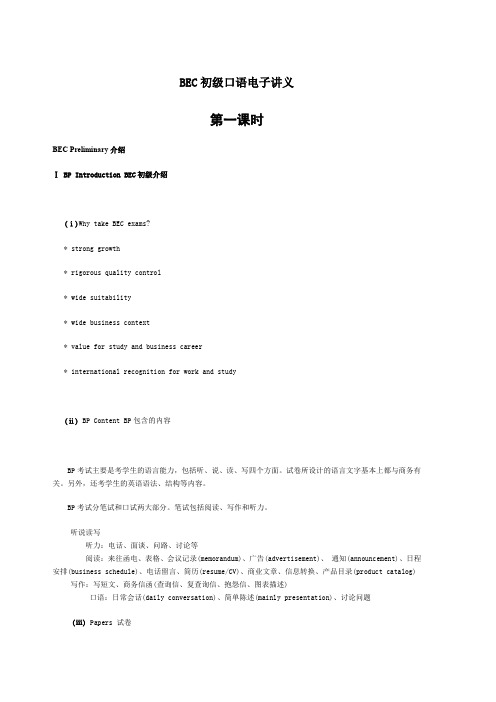
BEC初级口语电子讲义第一课时BEC Preliminary介绍Ⅰ BP Introduction BEC初级介绍(ⅰ)Why take BEC exams?* strong growth* rigorous quality control* wide suitability* wide business context* value for study and business career* international recognition for work and study(ⅱ) BP Content BP包含的内容BP考试主要是考学生的语言能力,包括听、说、读、写四个方面。
试卷所设计的语言文字基本上都与商务有关。
另外,还考学生的英语语法、结构等内容。
BP考试分笔试和口试两大部分。
笔试包括阅读、写作和听力。
听说读写听力:电话、面谈、问路、讨论等阅读:来往函电、表格、会议记录(memorandum)、广告(advertisement)、通知(announcement)、日程安排(business schedule)、电话留言、简历(resume/CV)、商业文章、信息转换、产品目录(product catalog) 写作:写短文、商务信函(查询信、复查询信、抱怨信、图表描述)口语:日常会话(daily conversation)、简单陈述(mainly presentation)、讨论问题(ⅲ) Papers 试卷e.g. The TV show was interrupted by too many commercials.prospecte.g. He called on some prospects but failed to make a sale.makee.g. These products are of Chinese make.The factory manufactured five makes of tractors.(2) 短语方面soft selling hard sellingSome sales people adopt a direct ‘hard sell’ approach, while others use a more indirect ‘soft sell’ approach.have a bad yearThe corporation is having a bad year and it will probably be necessary to dismiss a few office staff.break into/penetrate the marketThere is chance that we’ll manage to break into the UK market.(3) 句型方面I am writing to you concerning…I can’t agree more.You can always reach me at the number…We would very much appreciate it if you could…I noted with interest your advertisement for…That’s exactly what I think.You are wanted on the phone.As requested, we enclose for your attention…2. 熟悉世界贸易组织。
商务英语口语培训内部资料

Lesson One 自我介绍(Self-Introduction)Lesson Two 更多了解(Effective Question and Answer Techniques)Lesson Three 电话技巧(Western telephone etiquette)Lesson Four 制定日程(Setting agenda for meetings, travel and events)Lesson Five 安排事物(Inviting, accepting, declining, offering, refusing)Lesson Six 商业用餐(Translations on foods, showing opinions)Lesson Seven 工作之余(Choosing and developing topics of conversation)Lesson Eight 工作面试(Job interview)Lesson Nine 办公自动化(Office Automation)Lesson Ten 商业会议(At the Meeting)Lesson One自我介绍(Self-Introduction)WelcomingOn behalf of …, I’m very glad to welcome you…It’s a pleasure to see you here.Welcome to…Thank you for coming all this way.Self IntroductionPlease let me introduce myself. I’m…How do you do? My name is…May I introduce myself? I’m…It’s a pleasure to make your acquaintance. My name is…Third-party IntroductionIt’s my pleasure to introduce you to …I’d like to introduce you to …A, let me introduce you to …A, I’d like you to meet …A, I don’t believe you’ve ever met …This is …He’s in charge of…He looks after…He’s our …Director/Manager.OfferingLet me get you a coffee.Would you like a coffee?Let me take your coat.Small talk topicsTravelHow’s your flight?How do you like our city?Is this your first visit to…?Did you have a good trip?Was it easy to find here?WeatherIt’s a beautiful day, isn’t it?I heard it’s going to rain this afternoon.My flight was cancelled because of the heavy snow.There will be a storm tomorrow.Finally we’ve gotten a beautiful day.I hate the summers here. There’s too much rain and it’s usually very hot.I’m a spring/summer/autumn/winter person.Cold, isn’t it? I’m freezing.It’s lovely/sunny/warm.It was dismal/cloudy/cold/damp/wet/stormy/windy.AccommodationHow’s your hotel?It’s very comfortable/convenient/luxurious.The service is excellent.It’s rather noisy/dirty.The service is rather slow.The rooms are a bit cramped.Sample DialogueA: Welcome to ABC. I’m John Smith. I look after the accounting department here.B: Nice to meet you. My name is Susan Wong.A: Nice to meet you, Susan. How was your trip?B: Slow. It was caught in awful traffic.A: Sorry to hear that. Anyway, have you checked in?B: Yes.A: Everything OK?B: Fine.A: So how do you find our weather?B: It’s hot. When I left home, it was only ten degrees.Lesson Two 更多了解(Effective Question and Answer Techniques)GreetingsGood morning/afternoon/evening.How are you doing?How’s everything going?How have you been?What have you been up to lately?What’s new/cooking/grilling/going on?Hi/Hey/What’s up!ResponsesI’m doing very well. Thank you. How about yourself? Okay/Not bad/All right. How are you?Great! Thanks. What about you?Couldn’t be better! You?Same ol’.Awful. /Couldn’t be worse.JobsWhat do you do?I’m a teacher/lawyer/nurse. (profession)I work in finance/waste management/show business. (field of business)I’m in marketing/human resource/executive administration. (function)I work for the ABC Corporation. (employer)I work for myself at the moment. (self-employed)I look after the children. /I’m a homemaker.I’m between jobs right now. (unemployed)How long have you been with them?How do you like it (your job)?How’s business?FamilyAre you married?What does your husband/wife do?Do you have any kids?How old are they?Are they at school/at college/working?Do they still live at home?Spare timeWhat do you do in the evenings/on weekends? Where do you spend your holidays?What do you do in you spare time?Do you like movies/gardening/sport/cooking?OriginsWhere do you come from?Where did your family come from?Where were you brought up?How young were you when you moved to New York? Which part of China were you born in?Sample DialogueA: What do you do? (question)B: I’m self-employed. (answer)A: That’s great! I always want to do that. (comment) B: Well. It’s a very hard job too. (added information)Lesson Three电话技巧(making and answering phone calls, western telephone etiquette)Answering the phoneHello!Good morning. GrantHotel. Reception. Susan Park speaking. How may I help you?Susan Park’s Office.SusanPark/Susan/Park.May I know who’s calling please?May I know what this is in reference to?Asking to speak to someoneMay/Could/Can I speak to/with Dr. Smith please? This is John Green speaking.I’d like to speak to Dr. Smith please. This is John Green.This is John Green from ABC. Is Dr. Smith in, please?Is Susan there?Dr. Smith please.I’m with…and I need to talk with…about…I’m representing …May I speak with…, please?Asking someone to wait for a momentWould you mind holding a minute while I try to find her? Could you hold on, please?Please hold on for a second.One/Just a moment, please.Hang on. I’ll get him.Just a second.One moment, please. I’ll see if he’s in.Asking the caller to leave a messageI’m sorry but he’s not here right now. May I take a message or would you like to call back later?I’m sorry but he tied up/busy/occupied/in a meeting now. Would you like to have him return your call?I’m afraid he can’t come to the phone/speak to you/take the call at this moment. Could you call back in a few minutes/later/in a little while?I’m sorry he’s not answering the phone. Perhaps he stepped out for a moment. May I have him return your call?Transferring informationCould you repeat that, please?Could you say it once again?Can you say it louder/slower?Have you got that?Could you please spell it?Anything else?Would you like me to read it to you again?Let me repeat to see if I get it.Lesson Four 制定日程(setting agenda for meetings, travel and events)Making appointmentI’m calling to make an appointment with you for next Monday.I wonder if it would be convenient to meet you tomorrow. Would it be convenient if I call on you tonight?Could you arrange an appointment with Mr. Green for me?I’d like to drop by tomorrow to talk over our plan.I look forward to seeing you at your office on July 18.Can you squeeze in some time for me next week?Suggesting a timeCan you make it at 3:00 on Monday?Will 9:00 be alright/okay with you?How about/what do you think of 3:30?Let’s say about 9is tomorrow?Anytime before 6 p.m..Anytime except Monday will be fine/okay/all right with me.I’m available from 9:00 to 3:00.Making enquires about flightsI have an enquiry about the flights to London on Saturday. Have you got any morning flights on Sunday from Beijing to New York?Is it a non-stop flight?How long will the flight take?What’s the fare for a one-way/round trip to Shanghai?When does the flight depart/leave?When is the departure/arrival time?Is there a discount for a night flight?Can you put me on the waiting list?What time am I supposed to check in?Booking ticketsI’d like to book a business class ticket on United Airline Flight 518 to Boston.Can I make a reservation for a morning flight on May 3rd, please? I’d like to stop over in Chicago if it all right.I’d prefer first/business/executive/economy class.Could you book me an aisle/a window seat?Could you make arrangement for vegetarian meals? Confirming and canceling reservationsI’d like to reconfirm my connecting flight reservation.I wonder if I could cancel my reservation with United Airlines to New York on November 16.Sample DialogueA: Good morning. Can I please have your ticket and passport? How many pieces of luggage would you like to check in?B: Just this one piece. Can I carry on this bag?A: Sure. I’m sorry. Your luggage is 8 kilos overweight.B: How much should I pay for the excess weight?A: The charge for excess weight is 6 dollars per kilo.B: Guess I don’t have a choice.A: Here’s your boarding pass, ticket and passport. Have a good trip, sir.Lesson Five安排事物(inviting, accepting, declining, offering, refusing)Making invitationsI would like to invite you to a reception next Sunday at my home.I would like to invite you to dinner at the new Chinese restaurant. Would you like/care to join us for dessert and coffee?Would you like to go to New York with me next month?I was wondering if you’d like to go to the beach on Saturday.I was wondering if you’d like to come to dinner on Tuesday evening.Can/Will you meet me at the mall after class for some shoe shopping?Can you come over tomorrow night and watch the game with us? How/what about a movie tonight?Why don’t you/not jog with me in the mornings?Why don’t you stop by for a visit on your way home?Thank you very much.Thanks for your invitation. I’d be delighted to. /I’d love to. Sure. That would be fun/wonderful/great.What a terrific idea! I’d really love to.Sounds great!Sounds like fun!Sure thing!I’ll see you there.Dinner/6:00 it is!Why don’t we!Declining invitationsThank you, but I’m afraid I have other plans for that night. Thank you, but I’m afraid I have an appointment that day. I’m sorry. I can’t go to the movie with you. I…(excuse)I wish I could, but I’m busy. Maybe another time, though.I hate to turn you down, but I must…I would love to any other time, but I’ve already made plans. Thank for asking, but…I appreciate the invitation, but I’m afraid I can’t.I’m afraid I can’t, but thanks anyway.What about a rain check?Lesson Six商业用餐(Chinese/western/business table manner, translations on food’sname, showing opinions)Ways of cookingBakedBoiledSteamedStewedBraisedDeep fried/pan fried/stir friedGrilledBarbecueWays of cuttingWholeSteakChunkDicedSlicedShreddedMinedSkewerCommenting on foodIt smells good/looks great/tastes delicious.The sweet potato pie is the best that I’ve ever had.Sichuan food is too hot for me. My mouth is burning.This dish tastes kind of salty/sour/greasy/stale.The soup is too heavily seasoned/plain.Proposing a toastMay I propose a toast to our friendship and cooperation?I’d like to propose a toast to our distinguished American guests. Let’s drink to your promotion.Here’s to your health/pleasant trip to Beijing/a successful new year.Cheers!Asking for checkMay I have the check please?I’m afraid you made a mistake here.Could please make sure the check gets to me?Check, please.Paying for the checkIt’s on me.It’s my treat.Let me do the honor.I’ll get it this time.I insist.Let’s split it.Let’s go 50/50.Lesson Seven工作之余(after-work entertainments, choosing and developing topics ofconversation)Introducing topics/agendasI’m glad to bump into you. I wanted to ask you about…While we’re on the subject…I just wanted to mention…You know you mention…?There were a couple of points I wanted to mention…The other point was…There’s just one thing I wanted to say…Changing/ending a topicAnyway, let’s talk about something else.So, let’s leave that (for later).Changing the subject for a moment…By the way…Talking of…That reminds me…Checking and clarifyingDo you see what I’m getting at?Is that clear?Do you mean…?Are you saying…?Let me see if I get it clear/correctly. Do you mean…?Asking about hobbies and interestsDo you have any hobbies and interests?What do you do in your spare/free time?Expressing likes and dislikesI like football.I love reading.I enjoy cooking.I adore Tom Cruise.I’m interested in antiques collections, especially Chinese antique furniture.I’m quite into golf.I’m crazy/mad about rock’n’roll.I fall for folk dance.John is enthusiastic about hiking.I don’t like soccer.I hate boxing.Expressing preferencesI prefer jazz to pop.I prefer staying at home to going out with him tonight.I prefer to play badminton rather than play basketball.Joe has a preference for European movies.Of all kinds of music, I like R&B best.Classical music is my favorite music.Hip Hop is my least favorite.As far as I am concerned, poetry reading is for the birds.For me, the best time is to sit back with a cold beer in my hand. I’d rather take the bus home.Sample DialogueA: Have you watched any movie lately?B: Not really. I have been kept busy recently.A: That’s too bad. I went to watch the Red Dragon the other day. It’s really fantastic.B: Red Dragon? I haven’t even heard about it.A: What are you? From the cave? It has been an instant hit after it was put on show in the theatre.B: Well, I told you I was busy. So what was it about?A: It’s actually the prequel to The silence of the Lambs. In this one, the story of a former FBI agent Will Graham, who was nearly killed by Hannibal Lecter, is told, and it includes the initial capture of “the Cannibal”.B: Really? I have watched The silence of the Lambs. It features Anthony Hopkins and Jodie Foster, right?A: You are right. But the new movie has a stronger cast, including young talents like Edward Norton and Ralph Fiennes. Of course, Anthony Hopkins stays and still plays Dr. Lecter.B: It sounds really exciting. I should try to find some time to go.Lesson Eight 工作面试(Job interview)About educationWhat is your education background?I graduated from PekingUniversity.I attended NewOrientalSchool for its spoken English courses in 2003.I’m a law/accounting/mathematic major.I minored in finance/computer science.I have a BA/BS/BBA/MBA/MS/MA/PHD degree in Chinese literature/Computer science/finance.I received my BA degree from TianjinUniversity in 1999.I finished primary school in 1990, and went to middle school that September. I graduated from high school in July 1996, after which I entered Shanghai University of Foreign Studies.About honor, award and activitiesI won the university scholarship for three academic years.I won second prize in the English Speech Contest of our university in 2001.I’ve received the honor of the most outstanding student in 2000.I served in the schools basketball team/as monitor for class.About ExperienceHave you got any experience in management?I’m afraid not. I’ve jut graduated from college. Though I have no experience in this field, I’m willing to learn.I worked as an interpreter in a foreign trade company for 3 years. I’m currently with a state-owned enterprise.I’m an administrative assistant with a joint venture company. I’m in charge of the personnel department.Reasons for quitting and applicationI quit due to the expiry of my employment contract.My job is not in line with my area of study.I didn’t like the working environment there and there was little opportunity for advancement.I’d like to work in a company that gives me more room for personal growth.I’d like a career that’s more dynamic and challenging.I’d love have an opportunity to further develop my abilities. Yours is a famous company with excellent management. If I have an opportunity to work in such a company, I believe I’ll be able to fully develop my abilities and obtain wider experience, and at the same time, make valuable contributions to the company.Yours is a multi-national corporation mainly engaged in manufacturing electronic products, with its headquarters in the USA. You entered China’s market 5 years ago and your products made in China are enjoying good market shares both at home and abroad.About qualificationI was specially trained for this kind of job.For the past four years, I’ve been working as office director for a joint-venture.I’ve had many years of experience in customer service.I have the educational background and relevant experience required for the job.Since my past work experience is closely related to this job. I’m confident I can do this job well.I know a lot about how north China’s market works and how business is done there.Besides Mandarin, my mother tongue, I can also speak English, Japanese and Cantonese.I have been holding a driver’s license since 1999.I’ve got a certificate of CET band 6.I’m energetic and decisive. I always manage to have things done on time.I maybe kind of shy around people. But I’m working on it by creating myself more opportunities to social.Lesson Nine 办公自动化(Office Automation)Talking about hardwareI’d like to buy a computer with up-to-date components.I’m afraid this software is not compatible with the main board.Your memory is too small to run this application software.A good model of computer includes a Pentium 2.2G processor, 256MB of RAM, a 40GB hard drive, a DVD-ROM drive, a SB live deluxe and a 17-inch monitor.Talking about virus, internet and operationVirus is a self-duplicating computer program that interferes with a computer’s hardware of operating system.In order to protect your data, you need to install a powerful anti-virus program on the hard disk.These two documents have been infected with a virus.CIH is a very destructive virus.CIH virus triggers/strikes/breaks out on the 26th of April or any month.Do you often go online?I love surfing the internet.He’s a netizen/nethead/cyber addict.John Dow has a lot of net pals.What kind of web site do you often browse?Our homepage was attacked by hackers.Do you do online shopping?You can download all kinds of cute clip arts from this site.My computer is down again.Press the right button on the mouse.Move the cursor here, and double click the left button on the mouse.Please key/type in your password.Please log in/out.Remember to save before you exit.Please backup your important documents on a mobile hard disc drive.Giving instructionsKey in your password.Insert a floppy disc into Drive A.To turn on the machine, turn the power knob clockwise. Turn it counter-clockwise to turn it off.Press the button once to start the machine. To stop it, press the same button once again.If you press these two keys (ctrl and space bar) at the same time, you can switch the status from English to Chinese, or vice versa.Lesson Ten 商业会议(At the Meeting)Starting a meetingShall we get started?Now that everyone is here, let’s get down to business.We are going to discuss three problems this morning.Proceeding to the next itemShall we move on to the next item on the agenda?Let’s turn to the second problem.How about proceeding to the next question?Guiding people in the discussionFirst, I’d like Mr. Hunter to briefly introduce the situation. Could you elaborate on that?Miss Brown, can we have your report now?Would you take the minutes of the meeting, Miss Jones? Would you wind up? We’re running out of time.Whose turn is it next?Coming back to the main pointI think we are getting side-tracked.Shall we get back to the main point?I’m afraid we’re getting a bit off the point.I see your point, but could we please stick to the main problem here?Checking agreementAre we all agreed?Do I have your support on this?Are we all for this plan?Are we all in favor of this decision?Has anyone got any objection to this proposal?Do we all agree on this?Those in favor/against, please put up your hand.Meeting’s adjourned.Let me take a minute to sum up the main points of this discussion.If nobody wants to add anything, we can draw the meeting to a close.That’s about all.Giving an opinion and introducing ideasI think…In my opinion, …Personally,…As far as I’m concerned,…As I see it,…Wouldn’t it be possible to…Could I make an additional recommendation?I’d like to make one more point.Agree with an opinionYes, I quite agree.I entirely agree with you.That’s exactly what I have in mind. I’m all for this plan.I’m in favor of this proposal.I can’t agree more.You’re absolutely right.Half-agreeing with an opinionYes, I agree up to a point, but…Yes, in a way, but…Yes, I partially agree, but…I suppose so, but…Well, you’ve got a point there.There’s something in that, I suppose.Disagreeing politelyI’m having a second thought on that. Well, I don’t know.Well, I think it depends.Well, I’m not sure about that.Do you think so?Are you sure about that?Disagreeing stronglyNo, I disagree.No, I don’t agree with you at all.No, I wouldn’t accept that for one minute.附录:《高级商务英语口语》目录Lesson 1 Formal Verbal Communication in Business ILesson 2 Formal Verbal Communication in Business IILesson 3 Cross-Cultural Communication in BusinessLesson 4 Business EtiquetteLesson 5 Contract EnglishLesson 6 Negotiation EnglishLesson 7 Business ReportingLesson8 Business News ReadingLesson9 Interview English世上没有一件工作不辛苦,没有一处人事不复杂。
Unit 1(商务英语口语实训 下册)

Sample dialogue (part 2)
• A: Well, we'll have a lot of difficulties in persuading our clients to buy at this price. But the comforting part is I've inspected your units, and I am very happy with them. Your goods are all far above standard quality. • B: We don't sacrifice quality for quick profits. We spend a lot of money to make sure that our quality is much better. • A: Well, we're really interested in placing an order under further negotiation. We can start the negotiations as soon as you prepared. • B: Thank you very much. I believe the contract will bear fruit in no time, and I hope our continuing cooperation and further extension of our trade relations. • A: That's what I want, too.
take up 开始;开始从事
• • • • • He took up writing after graduation. 毕业后他开始从事写作。 to take up swimming 开始学游泳 He did not particularly want to take up a competitive sport. • 他并没有特别想要开始从事竞技性运动项 目。
国际商务英语口语实训Module 1 Introduction and Greetings

Module 1 Introduction and Greetings
Background Information
Do not attempt to address a stranger by title. It is always better to say “Excuse me” to get someone’s attention. In this way you will never use the wrong title and he or she will not be offended. On the other hand, foreigners always feel confused about Chinese names. They usually can not distinguish the given name from the family name. Therefore, when introducing yourself to a foreigner, you may state clearly how you wish to be called. Xiao Li or Mr. Li or you may simply tell him or her, “Please call me….”.
国际商务英语口语(第三版)unit1-5

LOGO
USEFUL SENTENCES
卖方陈述坚守信用证的理由
1. It is our usual practice to require sight L/C. We cannot make an exception this time.
要求即期信用证/见票即付的信用证支付是我方的一贯作法。这次不能破例。 2. L/C is a reliable and safe method of payment, and it protects the
USEFUL SENTENCES
LOGO
做出让步
1. As a special accommodation, we agree to your proposal and accept payment by D/P at sight, but this should not be regarded as a precedent.
占用资金
T/T (telegraphic transfer)
电汇
additional [ ə'diʃənl ] adj. .
额外的
expense [ ik'spens ] n.
费用
profit margin
利润空间
down payment
定金
remit [ ri'mit ] v.
汇款
a/c no. (account no.)
3. For such a small amount, payment by L/C involves additional expenses for us. 由于金额太少,用信用证支付增加了我们额外的花费。
4. Opening an L/C causes us a lot of expenses because it requires a certain sum of deposit in the bank. 因为开立信用证需要一笔保证金,这给我们带来很大的花销。
商务英语口语实训(上册)Unit09 Price

Key Word(s):reasonable price
These jeans are on sale at reasonable prices.这些牛 仔裤正以一个合理的价格出售。 My friend knows where he can pick up a good used car for you at a reasonable price.我朋友知道他能在 哪儿以合理的价格为你买一辆好的二手车。 We focus on high-quality products at reasonable price, as well as excellent service and reliable reputation.我们专注于高品质的产品以合理的价格, 以及优质的服务和可靠的声誉。
Key Word(s): acceptable price
We'll place a big order if your price is acceptable .如果你方价格可接受,我们将下 一个大订单。 If the price is acceptable we would like to order now.如果价格合适,我们现在就想订货。 If you find the above price acceptable, please fax us for our confirmation.如上述价格可接受, 请传真给我方以便确认。
Key Word(s):
come to terms 妥协;达成协议;谈好条件
If you are prepared to cut down your price by 5%, we might come to terms. 如果责方愿意 减价8%,也许能达成交易。 If you insist on this price, we can hardly come to terms.如果你坚持你方价格,我们很难达成 交易。 Should you be prepared to reduce your price we might come to terms. 你们一旦准备好降 价我们就可以谈条款了。
Unit 1(商务英语口语实训 下册)
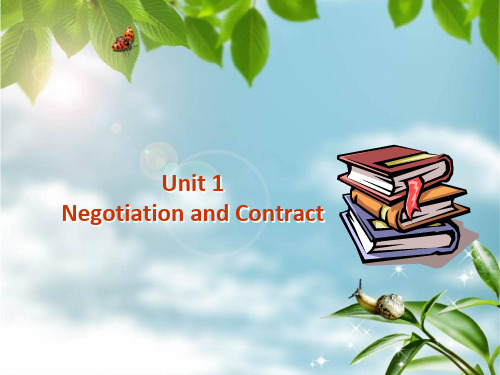
stipulate v. 规定;约定
• to stipulate a price • 规定价格 • the items stipulated in the contract • 合同中约定的条款 • She could have stipulated that she would
目。
Part Two Situational Dialogues Dialogue 2
skyrocket vi.剧增; 猛涨
Production has dropped while prices and unemployment have skyrocketed. 在物价和失业人数猛增的同时,生产却下降 了。 the skyrocketing costs of health care. 暴涨的医疗费用。
• Our payment term usually is to accept document against payment in 60 days, which we hope can satisfy you.
• 我方通常的支付条件是60天付款交单,希 望这令你方满意。
L/C= letter of credit 信用状
take up 开始;开始从事
• He took up writing after graduation. • 毕业后他开始从事写作。 • to take up swimming • 开始学游泳 • He did not particularly want to take up a
competitive sport. • 他并没有特别想要开始从事竞技性运动项
• The project is being backed by a letter of credit from Lasalle Bank.
《商务英语口语(拓展篇)》课件 商务英语口语(拓展篇) 第一章

根据市场行情分析,我觉得中东市场并不适合我们。
15
The market analysis result can help us to make the final decision.
市场行情分析能帮助我们做出最终的决定。
16
Market analysis is important and quite necessary in doing business.
Focus
Evaluation Culture
6
Project 1 Market Development
Part Ⅰ Warm-up
01 Task
A1
Work in pairs. Here are some possible reasons for sales decrease, tick some of the reasons and discuss with your partner for more details.
Part
Part
1
2
3
4
5
6
7
Warmup
Language Follow-up Language Performance Business
Activities
Expanding Practice
Focus
Evaluation Culture
职场商务英语口语的入门教材(精选)

1.职场商务英语口语的入门教材1.《新概念英语》这套教材的知识体系非常完整,很多人从小学开始就在用,虽然里面的商务知识比较少,但也涵盖一些商务英语表达,能让读者在阅读、口语、写作几项基本技能得到的提升。
2.《环球英语教程》全套教程共分六级(入门和一到五级),分别针对初级到中、高级英语水平的青少年及成人学习者。
语法、词汇贯穿全书,而且与语音训练紧密结合。
注重跨文化交际,将英语学习置于世界文化环境中。
3.《Express Ways》这套教材能全面训练听说读写,重点提高口语技能;引导你从最简单的日常场景练起,从求职面试、接待顾客到与权威人士交谈等最现代化的生活题材。
是很多商务人士最爱的自学辅助材料,能提升你选择话题、打开话题,以及表述、询问等方面的谈话技能。
4.《商务英语:初入职场》共有十个单元的内容,涉及求职、职场礼仪、市场、广告、财务、沟通、团队合作、企业战略等丰富主题。
特别值得一提的是,教材还为学生提供了与各单元主题相关的丰富拓展材料,体验真实商务情境,从容应对职场挑战。
5.《新剑桥生活与商务英语365》这个系列分三个级别,主要针对在职人员,是一套将工作和生活融为一体,时尚而系统的新锐商务英语教材。
初入职场的人如果能把这套教材吃透,商务英语表达能力绝对能突飞猛进。
2.常用职场英语口语句子1. You're in the pink!要想说人气色好,"You look fine!"当然不错,可如果你说"You're in the pink!"就妙得多了,实际上,在英语口语中,巧妙使用一些表示颜色的词能使得句子非常形象生动。
2. He is bouncy."他精力充沛"美国人通常说:"He is bouncy.",而不说"He is energetic",牢记一些日常对话中的句式是你生活中一把必备的钥匙。
《商务英语口语(基础篇)》课件 商务英语口语 第一章

(13)What provide you with a sense of accomplishment?
什么会让你有成就感?
16
Project One Career
Task One Brief Introduction
Part
Part
Part
Part
Part
Part
Part
1
本人具有良好的思想品质善于与人沟通善于与人协作能独立完成工作本人思想开放易于接受新事物有吃苦耐劳的精神
商务英语口语(基础篇)
Project One Career
A career is an individual's journey through learning, work and other aspects of life. By the late 20th century, a wide range of choices (especially in the range of potential professions) and more widespread education had allowed it to become possible to plan (or design) a career. Traditionally, career success has often been thought of in terms of earnings and/or status within an occupation or organisation. This can be expressed either in absolute terms (e.g. the amount a person earns) or in relative terms (e.g. the amount a person earns compared with their starting salary).
《商务英语口语》课件

商务英语口语PPT课件旨在帮助学习者了解商务英语口语的重要性,并提供 基本原则、常用礼貌用语、会议表达方式和提高口语能力的方法。
商务交际基本原则
1 尊重和礼貌
2 清晰和简洁
始终以尊重和礼貌的态度交流,注重对他 人的感受。
表达思想时要清晰明了,简洁准确地传达 信息。
3 积极倾听
4 适应不同文化
充分倾听对方的观点,积极参与讨论,展 示合作精神。
了解和尊重商务文化差异,以适应国际商 务环境。
商务英语中的礼貌用语
问候与介绍
使用适当的语言和礼节进行问候和介绍自己。
表达感谢
在商务场合中表达真诚的感谢之情,展示谦 虚和赞赏。
提供帮助
主动提供帮助,并表达愿意合作的意愿。
道歉和解释
以礼貌的方式道歉并解释任何不便或误解。
进行口语练习
找到合适的对话伙伴或加入商 务英语俱乐部,进行口语练习。
商务英语中的历史背景和文化差异
影响商务文化的因素
了解历史、宗教、价值观等因素对商务文化的影响。
尊重文化差异
具备跨文化沟通能力,尊重并适应不同的商务文化差异。
建立信任关系
维护良好的人际关系,促进跨文化交流和合作。
商务英语中的电话交流技巧
3 示弱礼貌
在表不满、建议或批评时,用礼貌的措辞,避免过分直接。
商务英语中的谈判技巧和策略
设定目标
确定谈判目标和底线,制定相 应的计划和策略。
积极沟通
运用合适的谈判技巧,积极主 动地展示自己的立场和诚意。
寻求双赢
以合作和妥协为基础,寻找双 方都能接受的解决方案。
商务会议中的表达方式
1
引入议题
简明扼要地介绍议题,吸引参与者的注意力。
商务英语口语的培训内容(精选)
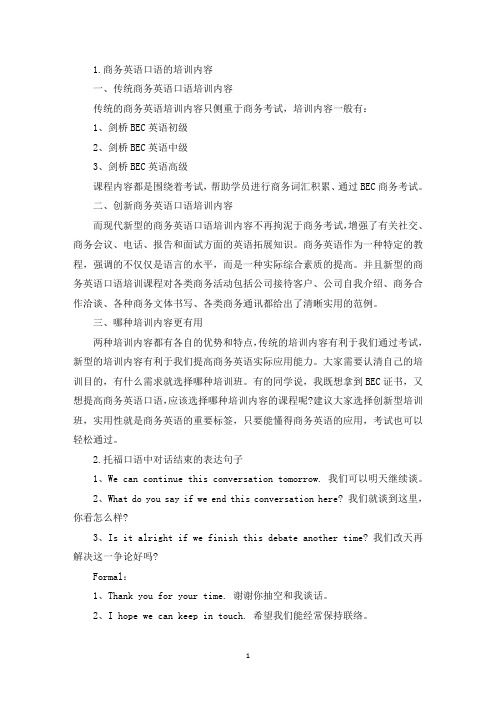
1.商务英语口语的培训内容一、传统商务英语口语培训内容传统的商务英语培训内容只侧重于商务考试,培训内容一般有:1、剑桥BEC英语初级2、剑桥BEC英语中级3、剑桥BEC英语高级课程内容都是围绕着考试,帮助学员进行商务词汇积累、通过BEC商务考试。
二、创新商务英语口语培训内容而现代新型的商务英语口语培训内容不再拘泥于商务考试,增强了有关社交、商务会议、电话、报告和面试方面的英语拓展知识。
商务英语作为一种特定的教程,强调的不仅仅是语言的水平,而是一种实际综合素质的提高。
并且新型的商务英语口语培训课程对各类商务活动包括公司接待客户、公司自我介绍、商务合作洽谈、各种商务文体书写、各类商务通讯都给出了清晰实用的范例。
三、哪种培训内容更有用两种培训内容都有各自的优势和特点,传统的培训内容有利于我们通过考试,新型的培训内容有利于我们提高商务英语实际应用能力。
大家需要认清自己的培训目的,有什么需求就选择哪种培训班。
有的同学说,我既想拿到BEC证书,又想提高商务英语口语,应该选择哪种培训内容的课程呢?建议大家选择创新型培训班,实用性就是商务英语的重要标签,只要能懂得商务英语的应用,考试也可以轻松通过。
2.托福口语中对话结束的表达句子1、We can continue this conversation tomorrow. 我们可以明天继续谈。
2、What do you say if we end this conversation here? 我们就谈到这里,你看怎么样?3、Is it alright if we finish this debate another time? 我们改天再解决这一争论好吗?Formal:1、Thank you for your time. 谢谢你抽空和我谈话。
2、I hope we can keep in touch. 希望我们能经常保持联络。
3、We should try to call each other more often. 我们应该经常地通通话。
- 1、下载文档前请自行甄别文档内容的完整性,平台不提供额外的编辑、内容补充、找答案等附加服务。
- 2、"仅部分预览"的文档,不可在线预览部分如存在完整性等问题,可反馈申请退款(可完整预览的文档不适用该条件!)。
- 3、如文档侵犯您的权益,请联系客服反馈,我们会尽快为您处理(人工客服工作时间:9:00-18:30)。
Greetings
初次见面
How do you do? Very nice to meet you. It’s nice to have you here.
Greetings
遇到熟人
Long time no see. Great to see you again. Haven’t seen you for ages/some time. How have you been(doing)? Hey, man. How’s it going? How are you getting on/making out? What’s up?
Greetings
关注气色
You appear well this morning. You’re in very good looks. You’re looking really good. You don’t look yourself. You have been off colour recently.
商务英语口语
Editor: 陈云 (Ada.Chen)
LOGO
Crazy English
李阳疯狂英语精髓
两个中心,一个标准。
中心一:以句子为中心。在句子中掌握单词、语法。 中心二:以口语为中心。通过口语突破,掌握听力、 阅读、写作、翻译,称作听说读写译一体。 标准:以脱口而出为标准。 实现脱口而出的方法: 1.掌握五大发音秘诀 2.掌握三最口腔训练法 3.掌握一口气训练法
Introduction
Responses
I have heard a great deal /so much about you. I have been looking forward to seeing you in person. Seeing is believing. Would you mind exchanging your business card with me?
Sample Dialogue A
A: Hey, man. Long time no see. How’s it going? B: Pretty good/Not too bad. Thank you! How about you? A: Same as ever! I’d like to introduce you to our manager, John Smith. B: Nice to meet you, John. I have been looking forward to seeing you in person. C: Nice to meet you too, Jack. Would you mind exchanging your business card with me? B: Of course. Here you are. C: Thank you. This is mine.
Introduction
Third-party Introduction
It’s my pleasure to introduce you to … I’d like to introduce you to … A, let me introduce you to … A, I’d like you to meet … This is … He’s in charge of… He looks after… He’s our … Director/Manager.
Offering
Let me help you with your luggage. May I help you with one of your bags? Our car is out in the parking lot. There’s a car waiting for you, so please come this way. Pls get in the back seat.
Greetings
正面回答
Quite well/Pretty good/All right, thank you! I’m doing great/good. How about you? Couldn’t be better! What about you?
Байду номын сангаас
一般回答
Not too bad, thanks. Same as ever. Nothing in particular.
Introduction
Self Introduction Please let me introduce myself. I’m… How do you do? My name is… May I introduce myself? I’m… It’s a pleasure to make your acquaintance. My name is…
五大发音秘诀
长元音拉长,双元音饱满; 短元音短促有力,干净利落,收小腹; 连读; 略读; 咬舌头。
三最&一口气训练法
三最”法就是“最大声、最清晰、最快速” 地“反复”操练句子或短文以达成地道英语 “脱口而出”。 一口气训练法:深呼吸,然后在一口气里尽 量多读。
3
4 5 6
Greetings
Offering Hotel Small talk topics
Welcoming
On behalf of …, I’m very glad to welcome you here. It’s a pleasure to see you here. Welcome to… Thank you for coming all this way.
Lead-in
I’m crazy about learning English.
I enjoy losing face.
I’ll do my best.
Just do it!!!
迎接外宾
Picking up the guest
1 2 Welcoming Introduction
